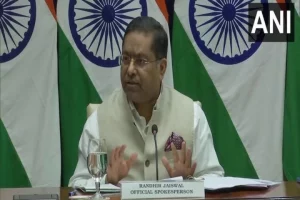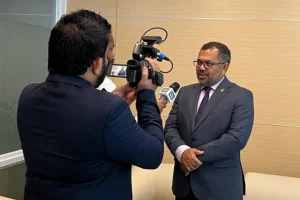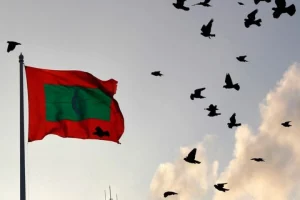Maldives, a small, but geographically dispersed clutch of islands at the centre of the Indian Ocean has seen considerable economic growth in the last decade. This growing prosperity has been followed with an ever-increasing demand for energy, which has been met almost completely through fossil fuel imports. The health of the Maldivian economy is almost wholly dependent on foreign imports, which takes a huge chunk of the country’s GDP.
Due to the Ukraine war, global oil prices have gone up, which has resulted in rising import bills for Maldives. In the first quarter of 2022, it imported oil worth MVR 1.7 billion and this year, the value of oil imports for the same period increased by 41.5 %, to MVR 2.5 billion. Achieving energy security through diversification of the sources of energy, has therefore become imperative to ensure a secure and thriving future of the Maldivian economy.
While it has no fossil fuel reserves, Maldives has been blessed with an abundance of renewable resources that can be utilised to produce solar, wind and ocean (tidal, thermal and wave) energy. Apart from being sustainable, a renewable resource-based energy model is also better for the planet and important for slowing down global warming and rising sea levels, which is likely to have dire consequences for the present and future of the archipelagic nation comprising low lying islands and atolls.
The Maldivian government, led by President Ibrahim Solih has certainly recognised the need to transition to renewable energy in order to reduce its imports, greenhouse gas emissions- the leading cause of global warming- and the high electricity prices (Maldivians pay some of the highest prices for electricity in South Asia). Solar radiation is the most viable source of energy production in Maldives, available for immediate exploitation and the Maldivian government has successfully implemented solar power projects in several islands under the Preparing Outer Islands for Sustainable Energy Development (POISED) project.
This is definitely a step in the right direction, but for small island countries like the Maldives, merely making a shift to renewable energy is not enough for achieving energy security. It has to be supported by a strong and stable infrastructure that stands the test of time and the vagaries of nature. This however, is a capital-intensive endeavour, requiring huge sums of money and technical know-how. This is where an energy partnership with neighbouring India, who has the resources- technical, human and financial- as well as a thriving clean energy industry, can be beneficial for Maldives.
India and Maldives embarked on their journey as energy partners in 2022, when the Indian Union Minister for Power and New and Renewable Energy R.K Singh met the Maldivian Minister of Environment, Climate Change and Technology Aminath Shauna to discuss the ways India could assist Maldives achieve its ambition to reduce its greenhouse gas emissions to net zero by 2030. During this meeting, two Memoranda of Understanding (MoU) were proposed by both leaders- one on energy cooperation and another, aimed specifically to facilitate Maldives’ transition to clean energy by setting up a transmission interconnection for transfer of renewable energy under the One Sun, One World, One Grid (OSOWOG) initiative. Plans were also set in place for a team from India to visit Maldives to confirm the technical feasibility of such a project, following which, a joint Detailed Project Report is to be prepared along with a survey for an undersea cable route and network augmentation in the Maldivian capital of Male. This plan, if implemented, would accelerate Maldives’ energy transition by allowing surplus renewable energy from India to be transmitted to Maldives.
The One Sun One World One Grid (OSOWOG) is based on the 3 critical pivots: sustainability, global interdependencies & India’s commitment to play its global role. The @WorldBank Group is committed to support #India & the global community in achieving this vision. – CD @JUNAIDWBG pic.twitter.com/itmswGU7MO
— World Bank India (@WorldBankIndia) September 8, 2020
The OSOWOG initiative is the most ambitious renewable energy effort till date and was launched in partnership with the UK during COP26 in Glasgow in 2021. This initiative aims to connect regional power grids (spanning 80 countries) through one common grid to facilitate the transfer of renewable power from countries with surplus power, to countries with a power deficit. There are of course a number of challenges for a project this grand in scale and involving this many participants, a few of them being that maintaining a stable grid across huge areas- with varying populations and energy demands- would be difficult, it would be an expensive endeavour and the transfer first and foremost, would require political acquiescence between the parties concerned. However, if successfully implemented, it would enable developed countries to help developing countries make the shift to clean, sustainable energy as well as enable them to meet their emission reduction aims. In fact, it could very well be the panacea for global warming and help stall climate change.
India assisting Maldives in its goal to achieve energy security- by helping develop the infrastructure to support energy generation through renewable resources- is also in line with India’s strategic interests in the Indian Ocean.
Energy security is a matter of national security since complete dependence on foreign imports makes a country especially vulnerable to incursions by foreign powers attempting to undermine its sovereignty in exchange for financial assistance. Maldives’ energy security problem therefore could very easily become a security problem for the larger Indian Ocean Region.
Furthermore, it is estimated that if the present rate of global warming continues, the country would be underwater by 2050. If that happens, it would trigger a massive global crisis involving climate refugees whose relocation will be the collective responsibility of all countries. An expedited energy transition through energy cooperation therefore is the need of the hour. It would require strengthening bilateral relations, deepening of existing links and bringing individual countries into a larger regional network of cooperation.
Also Read: Jaishankar amplifies PM Modi’s pitch of turning Maldives into a key Indian Ocean ally




















